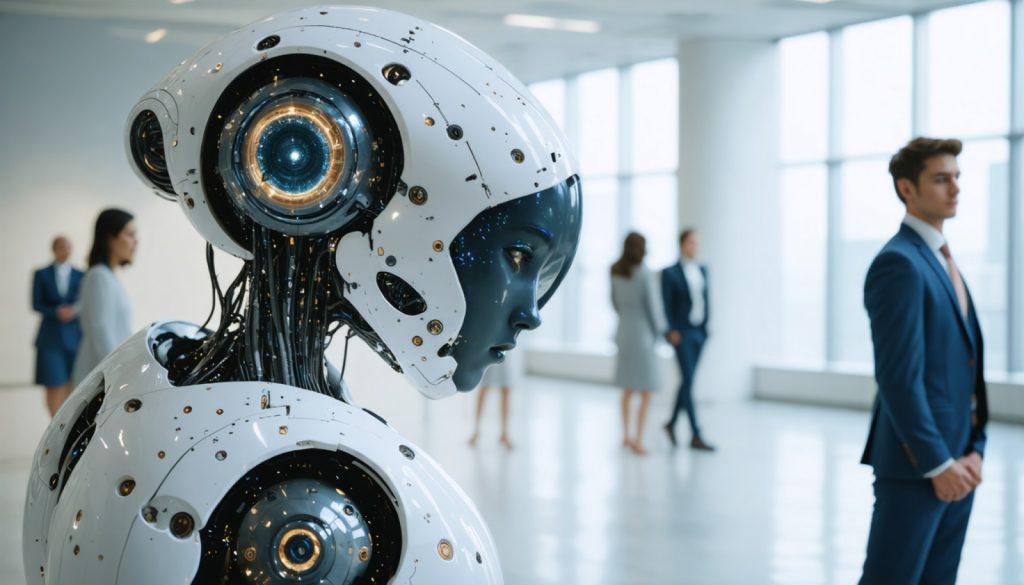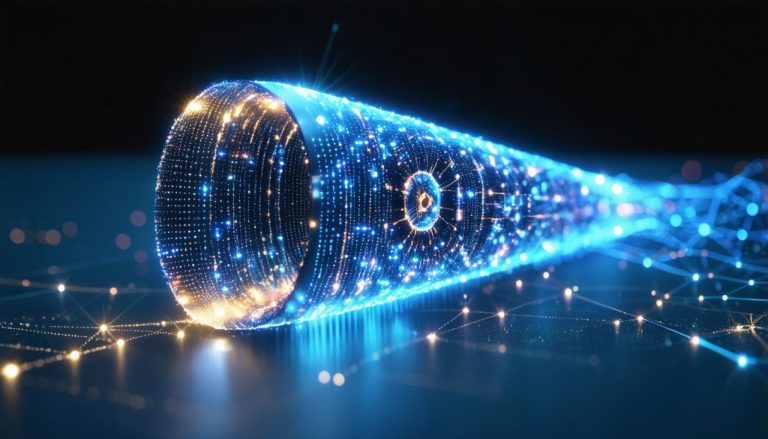
- Mark Cuban emphasizes the indispensability of human intuition in storytelling, which remains beyond AI’s capabilities.
- AI can generate numerous options rapidly, but only humans can discern the truly compelling narratives.
- Cuban describes AI as a “creative partner” that assists but cannot replace the human touch in art.
- The tension between automation and creative industries was highlighted by the 2023 Writers Guild of America and SAG-AFTRA strike.
- AI-driven creativity might find fleeting success, but the instinctive human element in storytelling will endure.
- Human insight and experience are crucial for crafting narratives that resonate culturally and emotionally.
- AI is a tool in the creative process, but the heart of art lies in human connection and depth.
Mark Cuban, the billionaire investor and media mogul, paints a vivid picture of a future where artificial intelligence, despite its astonishing computational prowess, remains a mere appendage to the core of true creativity. Unlike the predictable precision of a machine, storytelling thrives on the ebb and flow of human intuition, a realm where AI falters. Cuban asserts that while AI can churn out an avalanche of options within seconds, deciphering and selecting the golden narrative remains an inherently human trait.
Cuban recently shared his insights on the “Your Mom’s House” podcast, shedding light on the tension between automation and the creative industries. This discourse speaks to the heart of a modern-day conundrum, as creatives grapple with the fear of being sidelined by AI in pursuit of corporate frugality. The 2023 showdown between the Writers Guild of America and SAG-AFTRA epitomized this struggle, as their organized strike aimed to safeguard the human essence of storytelling against the burgeoning AI tide.
Cuban reiterates that AI, in isolation, lacks the alchemy required to concoct a commercially successful artistic piece. He metaphorically compares AI to a “creative partner,” capable of assisting but never replacing the human touch that breathes life into art. This sentiment finds grounding in the uncanny and inexplicable knack some creatives have for capturing the public’s imagination—an intuitive flair that remains out of reach for algorithms.
The rallying cry for the human spirit in storytelling gains urgency when we consider Cuban’s conviction that AI-driven creativity may gain temporary traction but ultimately hit a wall. The essence of storytelling—whether in cinema, literature, or beyond—resides in an intuitive grasp of audience pulse, a forte intrinsically tied to the human experience. Cuban’s message resonates with a powerful takeaway: while AI might be a technological marvel, it is the instinctive and unpredictable nature of human creativity that will continue to define compelling narratives across generations.
In Cuban’s vision, the essence of art lies not in the cache of data sets analyzed but in the visceral connection forged through human insight and experience. As AI becomes yet another tool in the ever-expanding creative arsenal, it is the human heart and mind that narrate stories, weaving them into the cultural fabric with nuance and depth machines cannot replicate.
Mark Cuban: Why AI Can’t Replace Human Storytellers
The Intersection of AI and Human Creativity
Mark Cuban provides a pivotal perspective in the ongoing debate about artificial intelligence’s role in creativity. Despite AI’s ability to process immense volumes of data and suggest potential narratives, Cuban emphasizes the irreplaceable human touch in storytelling. While AI offers computational prowess, the intuitive, emotional, and unpredictable nature of human creativity underpins effective storytelling.
Why Humans Still Hold the Ace
1. Intuitive Insight: Humans possess an innate ability to resonate with the audience’s emotions, which AI lacks. Intuition, empathy, and personal experiences shape compelling narratives, creating a genuine connection between the storyteller and the audience.
2. Nuanced Judgement: While AI can present numerous options, the skill to discern and choose the right narrative direction is inherently human. This decision-making process is not just analytical but is influenced by emotions and cultural understanding.
3. Emotional Resonance: Stories that leave a strong impact hinge on the emotional intelligence of the creator. Human experiences and emotional complexities cannot be fully captured or emulated by algorithms.
Industry Trends and Future Implications
Market Forecasts & Industry Trends
– Rise of AI in Support Roles: AI is increasingly used in supportive capacities, such as automating repetitive tasks, offering data-driven insights, and even suggesting storylines, but not without human oversight.
– Collaboration Over Competition: The future likely holds a synergy where AI and human creativity work in tandem. AI can assist in research and initial drafts, while humans refine and add emotional depth.
Limitations and Controversies
– Creative Autonomy: Critics argue that excessive reliance on AI can stifle genuine creativity and lead to homogenization in art, where everything feels algorithmically designed rather than organically developed.
– Ethical Concerns: AI-generated content raises questions about intellectual property rights, authorship, and the devaluation of human talent.
Real-World Use Cases
How AI Can Support Creatives
– Scriptwriting Assistance: AI tools can help screenwriters develop plot ideas or dialogue prompts based on an established tone or style.
– Content Personalization: Tailoring content for different audiences based on data-driven insights obtained through AI analysis.
Life Hacks for Creatives
– Embrace AI Tools: Utilize AI to manage logistics of content creation, like timeline maintenance, thereby freeing more time for creative processes.
– Continuous Learning: Stay updated on AI advancements to leverage new tools effectively and enhance creative output without losing the human element.
Reader’s Pressing Questions Answered
Can AI fully replace human creativity?
No, AI can support creative processes but lacks the emotional depth and intuition required to replace human creativity. This intrinsic human ability is essential for storytelling and artistic endeavors.
Are there any successful AI and human collaborations?
Yes, there are numerous instances where AI and humans have collaborated on creating music, writing scripts, and even designing artworks, with AI handling technical parts and humans elevating the emotional aspects.
Actionable Recommendations
1. Integrate AI Wisely: Use AI for idea generation and project management, but rely on human intuition for final decisions.
2. Enhance Emotionally Driven Skills: Focus on honing emotional intelligence and empathy as these are irreplaceable by AI.
3. Stay Informed: Regularly update your knowledge about AI advancements to utilize this technology without letting it overshadow your creative instincts.
Explore more insights on how technology intersects with daily life and creativity at Forbes.



